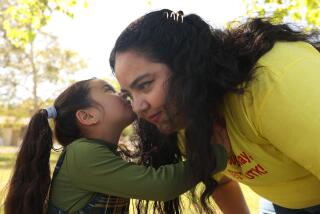EXPERT ADVICE
- Share via
Pity the poor parents trying to evaluate a school’s early reading program. On the one hand, they hear phonics works best and whole language is feel-good silliness that fails to teach essential skills. On the other, they hear phonics only teaches children how to bark at print and drains joy and meaning from reading and writing. What is a parent to do? Herewith, a brief guide for the perplexed.
Avoid zealots--unless they’re zealous about doing what it takes to get all children reading and writing successfully and joyfully. Neither extreme in the great reading debate is helpful; ideological absolutes don’t work in teaching.
Look for balance. All children benefit from a balanced literacy program that features phonics, literature, grammar, punctuation, spelling, writing and discussions. Knowing the right proportions of each is a tough call, and different children might need different things. Nonetheless, teachers must have the skill and motivation to provide a wide range of literacy experiences. Most children will benefit from a common core of elements (e.g. systematic phonics, spelling instruction, exposure to quality literature), so teachers need not develop a specialized plan for each child. The key is a comprehensive program that ensures that children acquire necessary skills, knowledge and attitudes.
Look to see that children are being taught to read and write and that they are actually reading and writing. Classrooms and libraries should reflect a balanced and pragmatic approach. There should be teacher-directed lessons targeting the sounds in words, phonics and decoding, reading comprehension, spelling, vocabulary and oral reading fluency.
There also should be many books on different reading levels about different topics and of many genres. Children should be productively engaged in reading and writing--some of it self-directed, some of it teacher-assigned. Teachers and other adults should monitor progress and provide help as needed.
Judge by results; be wary of excuses. The best gauge of a school’s program is students’ reading and writing levels. Ask to see what the teacher expects a majority of students in the class to be able to read fluently and with good comprehension by year’s end.
Be concerned about a school where more than a handful of students cannot read passages at their grade level by the end of the school year. (It’s unclear what are reasonable expectations for children learning to read in a language they are simultaneously learning; ideally, children should learn to read in a language they already understand.)
Learning to read is complex, and too many children face difficulties. Unfortunately, educators and others have gotten caught up in ideological wars and lost sight of the goal: helping children become successful readers and writers. Parents must insist on ending this nonsense and ensure that educators focus on providing a balanced, comprehensive literacy program to afford all children the skills, knowledge and attitudes needed for success in school and in life.
BOOK EVENTS
* Today in Montrose: Local children’s author Martin Nelson Burton will read and sign his book “The Whale Comedian” at 2 p.m., Once Upon a Time, 2284 Honolulu Ave. (818) 248-9668
* Monday in Torrance: Story time for children at 10 and 11 a.m., Catch Our Rainbow Children’s Books, 3132 Pacific Coast Highway. (310) 325-1081
* Friday in Long Beach: Preschool story time at 11 a.m., Long Beach Public Library, 101 Pacific Ave. (562) 570-7500
* Saturday in downtown Los Angeles: The L.A. Kids Read Festival, with storytellers, clowns, puppeteers and magicians, noon to 4:30 p.m., Central Library, 630 W. 5th St. (213) 228-7000






